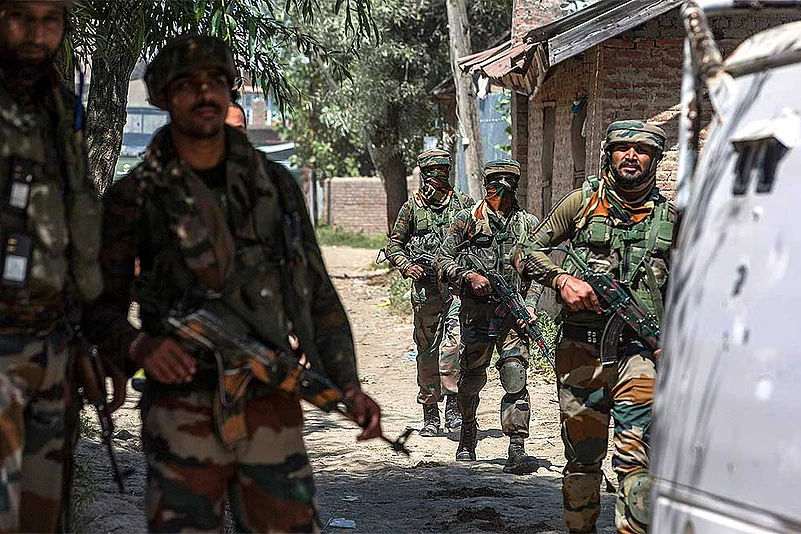The Parliament on Tuesday passed the resolution calling for the revocation of Article 370, which gave special rights to Jammu and Kashmir. It also cleared the Jammu and Kashmir Reorganisation Bill, 2019, seeking to split the state into two Union Territories -- Jammu and Kashmir and Ladakh.
However, the method in which Article 370 was abrogated has led to several speculations. Outlook's Salik Ahmed spoke to Dr Faizan Mustafa, the Vice-Chancellor of NALSAR University of Law, Hyderabad, to understand the legality of the Centre's move.
Is this move legally tenable?
As I told you, the constitutional questions are highly pertinent and would require an examination by the Supreme Court. But there are big constitutional issues -- can the governor be called the state government, can the constituent assembly be called legislative assembly, can you amend Article 370 like this, can you first use Article 370 to amend Article 367, and then use Article 367 to call the constituent assembly the legislative assembly, how the instrument of accession is to be interpreted, can governor act as legislative assembly etc. So, these are big constitutional issues. But if the matter goes to a constitution bench and it takes 2-3 years, then this issue will not really survive, because, in the meanwhile, there will be elections, there will be a union territory assembly, and that assembly might pass whatever resolution government wants.
Advertisement
There must have been safeguards for Article 370 put in place at the time of its creation?
What has happened is that the framework of the constitution has made it a temporary provision, because they wanted to give an opportunity to the constituent assembly of Jammu and Kashmir to take a final view on this. The constituent assembly of J&K took the final view that they want to remain in India and that they want to dissolve themselves after adopting the J&K constitution. The constituent assembly has been dissolved, and since there is no constituent assembly, Article 370 has become a permanent feature of the Constitution.
Advertisement
Was Article 370 brought as a temporary provision?
When it was brought, it was temporary because by that time the constituent assembly of Kashmir had not been constituted, and it had not met. Because the constituent assembly of Kashmir may have taken a decision that they want to go to Pakistan, or they want to hold a plebiscite, they decided they want this kind of special status, they endorsed Article 370, and they wanted to be governed by Article 370. So, how this Article 370 can now be amended – even though it says the President of India can modify it, and ‘modify’ may mean even repeal – is a question which the court will determine. If the court says that the constituent assembly means constituent assembly, as Justice Rohinton Nariman-led bench said in 2016 in SBI case, then, of course, the amendment will be bad in law.
And if it says that the constituent assembly is not there and its substitute is the legislative assembly, then it will be upheld... And Article 370 does not use any time frame. If you look at article 369, it specifically says for five years. If you look at, for instance, the provision that English shall be the official language, it is written for the first 15 years. If you look at the provision of reservation for SCs/STs in Parliament and assemblies, it was done for ten years. These kinds of provisions are temporary. Article 370 was not temporary. Even Supreme Court said so.
Advertisement
Let’s assume we’re having this discussion a week ago. What would be the ideal procedure to abrogate Article 370?
The ideal procedure, as I said, if you go strictly by the text of the constitution, then it is not possible to tinker with Article 370 like this. What is possible is to extend more and more provisions of the constitution and that is exactly what the government has done, that in one go, they extended the entire constitution to J&K. So, three-fourth of the Constitution was already applicable to J&K. The special status was largely a sentimental issue because
by and large, the entire constitution was already applied to them. Now, you said that you are withdrawing the earlier orders and making an order that the entire constitution will be applicable, which is not such a big deal. So, this is one way, the other way is taking people on board, taking all the stakeholders on boards, having wider consultations, and creating a kind of consensus through negotiations. That would have been a more democratic way of dealing with it. The trust deficit between Delhi and Srinagar should have been tackled first.
Advertisement
Does the governor represent the will of the people?
No, definitely not. The governor represents the will of the central government. He is a nominee of the centre. The Indian governors have proved to be agents of the centre in the states, they have not shown their commitment to the constitution, but to the party in power at the centre. They certainly cannot be called representatives of the people as they are not elected but nominated.
And can his stamp be taken as the concurrence of the state government?
No, it cannot be, definitely not.
Who can challenge the government's move to scrap 370 and why?
Advertisement
Anyone can challenge it. As I have said earlier, it’s a big constitutional change, it will certainly be challenged. There are lawyers who challenge such things through poorly drafted PILs. Their purpose is to get them rejected so that government take the stand that the court did not even hear this matter. It can also be challenged in any high court, so maybe, it will be first be challenged in Jammu and Kashmir High Court. And then subsequently in Supreme Court, but, my gut feeling is that no immediate verdict will come in this case.




















